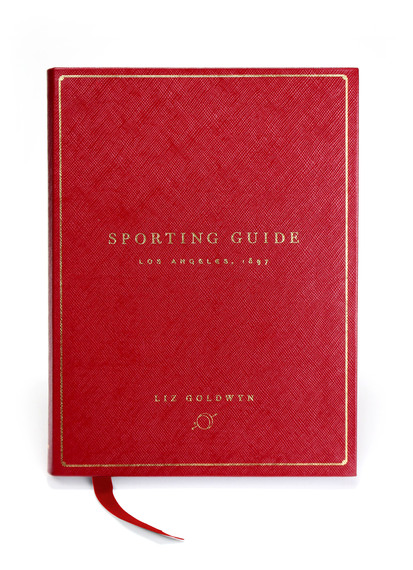Sex, power and the world's oldest profession are central themes of Sporting Guide (Regan Arts), a unique and highly imaginative piece of historical fiction by author Liz Goldwyn.
An homage to the days of the author's hometown of Hollywood long before it was Hollywood (1897 to be exact), the book depicts the long lost era of pimps and prostitutes, madams and crib lords where Vice and ill repute went hand in hand. Goldwyn literally time travels through the characters -- both real and imagined -- weaving their tales of life in and outside of the city's brothels through extensive original research and archival photos. Influenced by the works of John Dos Passos, Luc Sante's Low Life, Jack Black's You Can't Win and Hemingway's For Sale Baby Shoes Never Worn, the multi-faceted author was inspired by literature that "blurred the lines between fact and fiction."
Goldwyn's empathy with the female characters is also at the core of the book. "I am fascinated by women who have been forgotten or ignored by history and society
and think they are worthy of study, respect, understanding, and sympathy. Women didn't have a lot of choices for professions so why should we doubly condemn them?" she says. And while the book is set in the turn-of-the-century, the story's message is somewhat relevant today. "The fascination with sex and sexuality even though technology changes doesn't change the human experience of love, sex, desire and loss."
As the author and documentary filmmaker of Pretty Things: The Last Generation of American Burlesque (It Books and HBO) and the short film The Painted Lady in which Jena Malone has an encounter with a 19th-century prostitute, the topic of sex has been a recurring thread throughout her work. "My mother (screenwriter Peggy Elliott) was on the board of Planned Parenthood and very feminist and my father (producer Samuel Goldwyn Jr.) was a real charming playboy from a totally different era, so I have both perspectives. Plus I had four brothers," she details. "From a very young age, I was not judgmental and had a very open attitude and would come from school and ask, 'What are transvestites and transsexuals can you give me examples?" Her interest in prostitution can also be traced to the 1987 made-for-television movie Mayflower Madam with Candice Bergen as the blue-blood madam Sydney Biddle Barrows.
Goldwyn's obsession took her on a journey through dusty library archives from England and Yale to California and the local city courts. "I spent months reading through microfiche census records of LA from 1840-1910 and completely got sidetracked! I got so obsessed with the lives of all these people such as Baron Littlefinger, who is a midget and makes an appearance in the book and the brother Tom Thumb." She also discovered the underpinnings of California's new age movement filled with clairvoyants and psychics. "This is what I love about research as it's like a treasure hunt."
The 38-year-old's impressive resume and distinctive pedigree -- author, director, legendary style icon, vintage fashion collector, designer and member of Hollywood royalty (her grandfather was film mogul Samuel Goldwyn and brother Tony Goldwyn who plays the President on ABC's Scandal) -- will come in handy should Sporting Guide make it to the small screen. "I wrote it in longhand in 26 composition books and the characters have lived in my head for so long. I literally have it all mapped out and can see the interior design, make-up, costumes and the hair (styles)" which explains why the reader is deliberately left wanting more. And does she see herself in the story? "I would say that there was definitely part of the story and dialogue that came from more contemporary experiences. I identify with all my characters such as Cora Phillips and Mr. X. Every writer that writes fiction wants you to experience it as your own story though."

